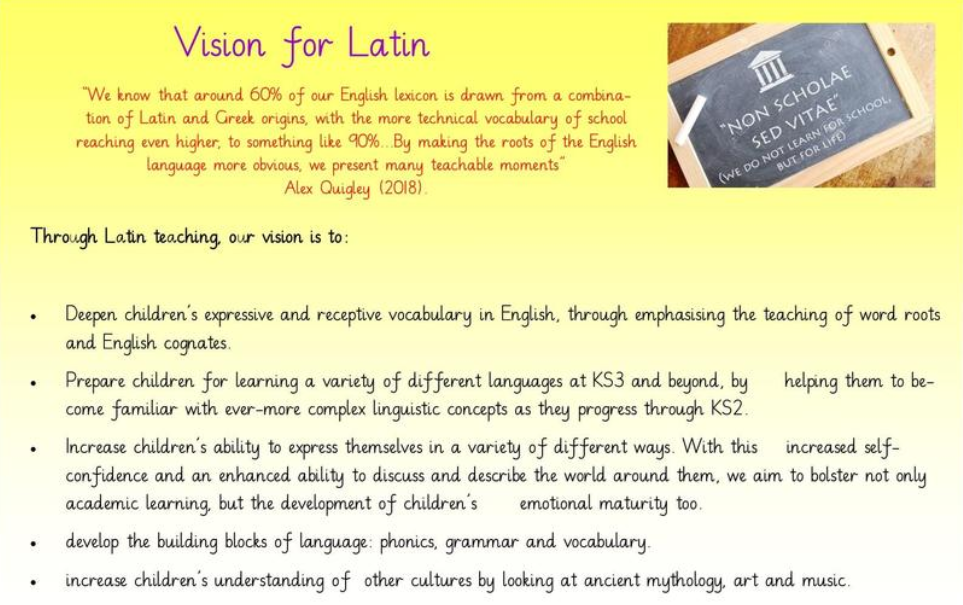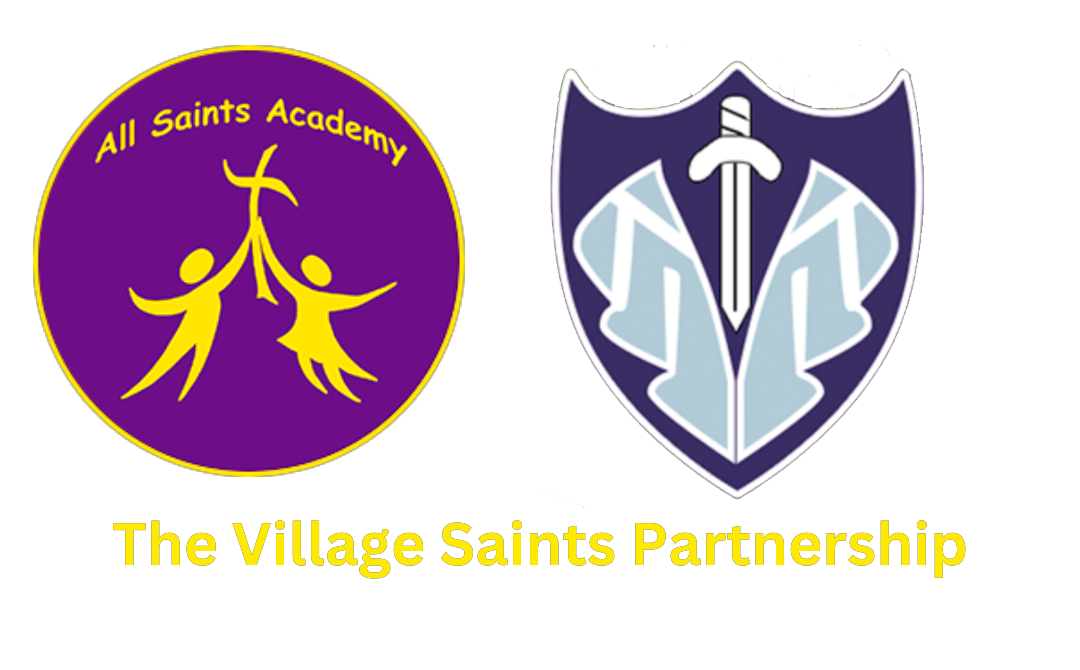
Languages Curriculum
Respecting, Generous and Achieving, Loving All Our Neighbours.
Welcome to Languages!
“We know that around 60% of our English lexicon is drawn from a combination of Latin and Greek origins, with the more technical vocabulary of school reaching even higher, to something like 90%...By making the roots of the English language more obvious, we present many teachable moments”
Alex Quigley (2018).
The development of language, vocabulary and communication (both receptive and expressive), plays an important part in the way we teach our pupils across the Village Saints Partnership. This begins in Nursery and EYFS with the teaching of systematic, synthetic phonics (Using the Read, Write, Inc. system) and continues as children progress through the school learning to express themselves fluently in oral and written English.
In order to develop this still further as children reach Key Stage Two, we place a great emphasis on the teaching and understanding of complex, tier two vocabulary. We aim to deepen children’s understanding of their own language, by exposing them to ever-more complex links to its Latin roots. The teaching of simple word roots in Key Stage One (which may include number roots, such as “tri” meaning three) prepares children for the explicit teaching of Latin and Classics as they reach Key Stage Two.
It has been demonstrated, that understanding of language and expansion of a child’s vocabulary in English and other languages (such as Latin) is a “convenient proxy for a whole range of educational attainments and abilities” (A Wealth of Words, E.D. Hirsch Jr). Furthermore, evidence shows that, alongside socio-economic status, vocabulary and understanding of language are two of the most significant factors, which proved relevant in children achieving expected grades in their GCSE English Language, English Literature and Mathematics examinations (Spencer et al, 2017).
Ambition for all children, regardless of starting points:
It is one of our key foci as a partnership, to prepare children for the next stage in their education and indeed the next stage in their lives. Many of our children will move on to attend local secondary schools where the main languages taught are romance languages (French and Spanish) as well as German and Mandarin. We feel that the teaching of Latin promotes readiness for language learning at Key Stage 3, because there are many concepts in Latin (such as gendered endings and a grammatical case system), which are also present in languages commonly taught to GCSE and beyond. These concepts are covered comprehensively within our Latin and classics curriculum.
Additionally, we want children to be confident in the fact that when they leave education, they can achieve whatever they want, if they set their mind to it. It is widely known that the study of ancient languages and classical civilisations has formerly been the preserve of the elite and those in positions of authority. We feel that our children deserve this same excellent standard of education in order to help them navigate – should they wish – the fields of employment that rely heavily on an understanding of ancient languages, such as medicine and law. We believe that the cultural capital which is encompassed within a solid foundation in Latin learning provides an excellent basis for this ambitious approach to education and social mobility.
Our teaching of Latin aims to go beyond simply preparing children for high-flying careers however. The British Cohort Study (Law et. al, 2009) demonstrated that children with restricted language, vocabulary and communication at the age of five are more likely to experience mental health and wellbeing problems as they move into adulthood. This is not something we want for our children. We aim - through the promotion of discussions around mental health as well as a broad, balanced and structured curriculum – to increase children’s ability to express themselves in a variety of different ways. Latin plays a pivotal role in this. With this increased self-confidence and an enhanced ability to discuss and describe the world around them, we aim to bolster not only academic learning, but the development of children’s emotional maturity too.
Latin language and the Church of England:
As a Church of England School partnership, we are keen to expose children to music, art and key texts from Christianity as well as a variety of other world religions. Historically, Latin has formed an important part of the Church of England liturgy and we aim to include this in our wider academic and SMSC offering where appropriate. This may include, but is not limited to the following:
- Drawing attention to Latin words or phrases in our daily collective worship.
- Strengthening elements of our R.E. curriculum by explicitly making appropriate links to Latin (for example, when teaching the concept of trinity or incarnation in LKS2, the Latin roots “tri” or “carn” may be taught alongside English cognates).
How we develop the building blocks of language – Phonics, Grammar and Vocabulary:
Children in our partnership schools begin structured Latin lessons at the start of Year Three. They steadily increase their ability to pronounce and manipulate sounds (phonics) and understand how these are represented in writing within the target language.
Across Key Stage Two, children are taught increasingly complex ways to manipulate language and translate to and from the target language. These skills are detailed in full in our skills progression documentation, but will include simple concepts such as masculine, feminine (and later, neuter) endings in year three and more complex concepts such as distinguishing between and manipulating the grammatical case system in years five and six.
When learning new vocabulary in the target language, children are encouraged to focus on more commonly used words which they are exposed to repeatedly (in order to help them commit these words to long term memory). They will be explicitly taught English cognates and other ways to remember key vocabulary (such as mnemonics and simple rhymes). We aim to help our children “do less with more” in their Latin lessons, so that by the end of Key Stage Two, they have been able to make substantial progress in one language.
Alongside the teaching of phonics, vocabulary and grammar, children will be exposed to ancient mythology and culture as part of our curriculum. This includes, but is not limited to, the following:
- A famous myth will be taught in depth each term and – where appropriate – cross-curricular links will be
- Older children will use their prior knowledge to translate and discuss written versions of classical mythology and literature. Initially, these may be simplified.
- Children will be taught the significance of Roman and Ancient Greek culture (topics may include education, festivals/religion, storytelling, food and invasion/empire).

Useful Links:
St Martin at Shouldham Primary
Tel: 01366 347260
Email:
office@st-martin.norfolk.sch.uk
All Saints Academy
Tel: 01366 501050
St Martin at Shouldham Address:
Lynn Road
Shouldham
King's Lynn, PE33 0BU
All Saints Academy Address:
Wretton Road
Stoke Ferry
King's Lynn, PE33 9QJ
DEMAT Office Address:
All Rights Reserved | St Martin at Shouldham Primary | Designed By We Are Doodlebug
